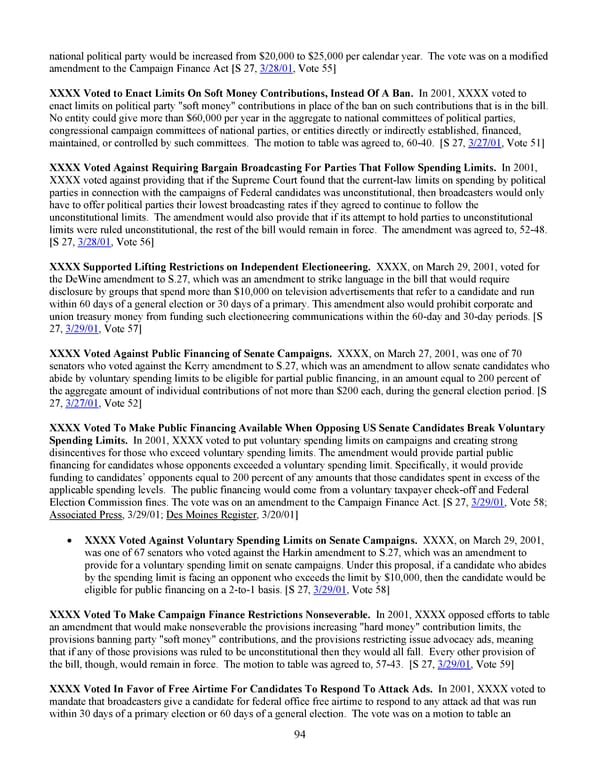national political party would be increased from $20,000 to $25,000 per calendar year. The vote was on a modified amendment to the Campaign Finance Act [S 27, 3/28/01, Vote 55] XXXX Voted to Enact Limits On Soft Money Contributions, Instead Of A Ban. In 2001, XXXX voted to enact limits on political party "soft money" contributions in place of the ban on such contributions that is in the bill. No entity could give more than $60,000 per year in the aggregate to national committees of political parties, congressional campaign committees of national parties, or entities directly or indirectly established, financed, maintained, or controlled by such committees. The motion to table was agreed to, 60-40. [S 27, 3/27/01, Vote 51] XXXX Voted Against Requiring Bargain Broadcasting For Parties That Follow Spending Limits. In 2001, XXXX voted against providing that if the Supreme Court found that the current-law limits on spending by political parties in connection with the campaigns of Federal candidates was unconstitutional, then broadcasters would only have to offer political parties their lowest broadcasting rates if they agreed to continue to follow the unconstitutional limits. The amendment would also provide that if its attempt to hold parties to unconstitutional limits were ruled unconstitutional, the rest of the bill would remain in force. The amendment was agreed to, 52-48. [S 27, 3/28/01, Vote 56] XXXX Supported Lifting Restrictions on Independent Electioneering. XXXX, on March 29, 2001, voted for the DeWine amendment to S.27, which was an amendment to strike language in the bill that would require disclosure by groups that spend more than $10,000 on television advertisements that refer to a candidate and run within 60 days of a general election or 30 days of a primary. This amendment also would prohibit corporate and union treasury money from funding such electioneering communications within the 60-day and 30-day periods. [S 27, 3/29/01, Vote 57] XXXX Voted Against Public Financing of Senate Campaigns. XXXX, on March 27, 2001, was one of 70 senators who voted against the Kerry amendment to S.27, which was an amendment to allow senate candidates who abide by voluntary spending limits to be eligible for partial public financing, in an amount equal to 200 percent of the aggregate amount of individual contributions of not more than $200 each, during the general election period. [S 27, 3/27/01, Vote 52] XXXX Voted To Make Public Financing Available When Opposing US Senate Candidates Break Voluntary Spending Limits. In 2001, XXXX voted to put voluntary spending limits on campaigns and creating strong disincentives for those who exceed voluntary spending limits. The amendment would provide partial public financing for candidates whose opponents exceeded a voluntary spending limit. Specifically, it would provide funding to candidates’ opponents equal to 200 percent of any amounts that those candidates spent in excess of the applicable spending levels. The public financing would come from a voluntary taxpayer check-off and Federal Election Commission fines. The vote was on an amendment to the Campaign Finance Act. [S 27, 3/29/01, Vote 58; Associated Press, 3/29/01; Des Moines Register, 3/20/01] XXXX Voted Against Voluntary Spending Limits on Senate Campaigns. XXXX, on March 29, 2001, was one of 67 senators who voted against the Harkin amendment to S.27, which was an amendment to provide for a voluntary spending limit on senate campaigns. Under this proposal, if a candidate who abides by the spending limit is facing an opponent who exceeds the limit by $10,000, then the candidate would be eligible for public financing on a 2-to-1 basis. [S 27, 3/29/01, Vote 58] XXXX Voted To Make Campaign Finance Restrictions Nonseverable. In 2001, XXXX opposed efforts to table an amendment that would make nonseverable the provisions increasing "hard money" contribution limits, the provisions banning party "soft money" contributions, and the provisions restricting issue advocacy ads, meaning that if any of those provisions was ruled to be unconstitutional then they would all fall. Every other provision of the bill, though, would remain in force. The motion to table was agreed to, 57-43. [S 27, 3/29/01, Vote 59] XXXX Voted In Favor of Free Airtime For Candidates To Respond To Attack Ads. In 2001, XXXX voted to mandate that broadcasters give a candidate for federal office free airtime to respond to any attack ad that was run within 30 days of a primary election or 60 days of a general election. The vote was on a motion to table an 94
 HRC vote skeleton Page 103 Page 105
HRC vote skeleton Page 103 Page 105